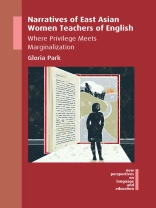This book is a powerful narrative of how six women experienced their lives alongside their desire to overcome the challenging and empowering nature of the English language. The volume shares who they are as transnational and mobile women living in the midst of linguistic privilege and marginalization. It is one outcome of a research project and the lived experiences which surround and influence (and were influenced by) it. The author documents how she and her research partners began studying what had drawn them to US TESOL programs, and how English was and is a symbol of power and privilege, a symbol of educational access and a pursuit of equity, yet, at times, is also a symbol of linguistic marginalization.
Tabla de materias
Prologue
Chapter 1: Rendering My Autobiographical Poetic Inquiry
Chapter 2: Exposing our Discourses of Privilege and Marginalization: Gender, Race, Class Connections to Teaching English
Chapter 3: “Writing is a Way of Knowing” in Promoting Evocative-Genres of Inquiry: Methodological Choices
Chapter 4: Where Privilege meets Marginalization in Han Nah’s Lived Experiences: Navigating her Multiple Gendered Identities
Chapter 5: Where Privilege meets Marginalization in the Narratives of Liu, Xia and Yu Ri: Exploring their Linguistic and Teacher Identities
Chapter 6: Being Critical of and Learning from the Women’s Narratives: Where Privilege Intersects Marginalization
References
Appendix A: Guidelines for Electronic Reflective Autobiographical Narratives
Appendix B: Guidelines for Electronically Journaling Educational Incidents
Appendix C: Interview Questions
Index
Sobre el autor
Gloria Park is Professor of Applied Linguistics and Program Co-Director of Graduate Studies in Composition & Applied Linguistics at Indiana University of Pennsylvania, USA.












